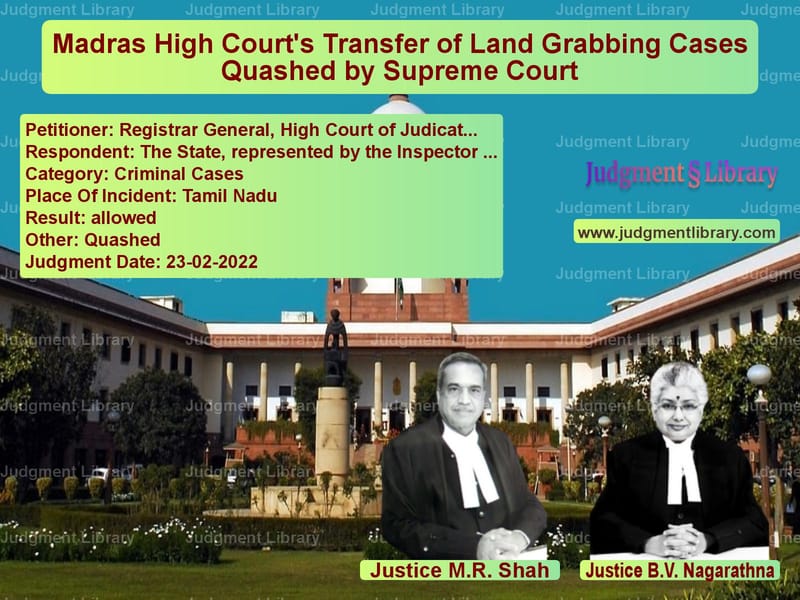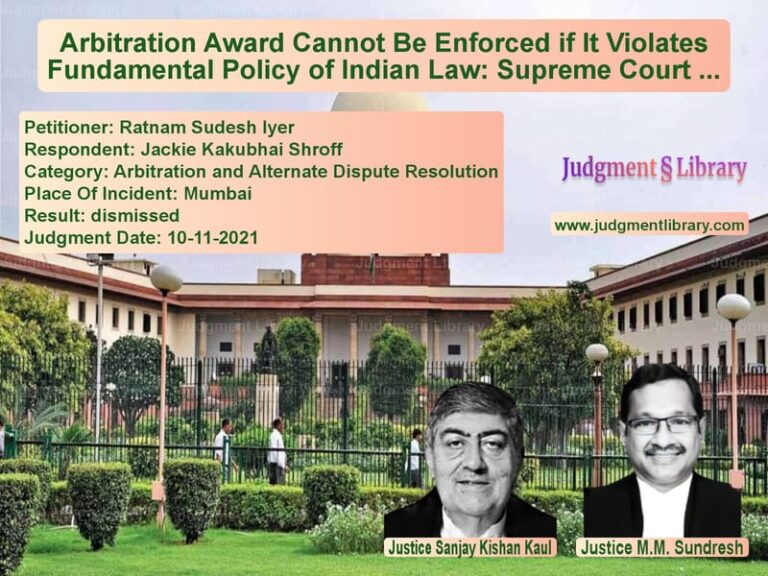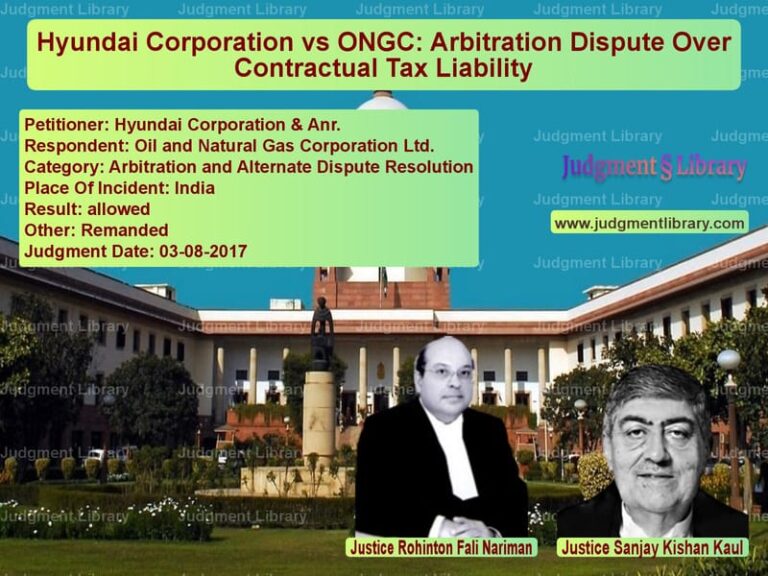Madras High Court’s Transfer of Land Grabbing Cases Quashed by Supreme Court
The Supreme Court of India, in a judgment dated February 23, 2022, quashed the orders of the Madras High Court that had directed the transfer of 864 land-grabbing cases from Special Courts to jurisdictional Magistrates. The Court found that the High Court had acted beyond its jurisdiction and violated an earlier stay order issued by the Supreme Court.
Background of the Case
The case involved the State of Tamil Nadu’s initiative to curb land grabbing by establishing 36 Anti-Land Grabbing Special Cells and corresponding Special Courts under Government Order (G.O.) No. 423, dated July 28, 2011. These courts were set up to expedite cases related to land grabbing.
However, the validity of these Special Courts was challenged before the Madras High Court, leading to a judgment on February 10, 2015, which quashed the government order. The State of Tamil Nadu challenged this decision in the Supreme Court, and the apex court, on February 27, 2015, granted a stay on the High Court’s order, thereby allowing the Special Courts to continue functioning.
Despite the Supreme Court’s stay, the Madras High Court’s Single Judge, in separate orders on August 5, 2019, August 27, 2019, and August 29, 2019, directed that 864 pending cases in the Special Courts be transferred to jurisdictional Magistrates.
Arguments of the Parties
Petitioner’s (Registrar General, High Court of Madras) Arguments
The Registrar General of the Madras High Court, representing the judicial administration, challenged the orders and argued:
- The High Court’s Single Judge passed the orders without any pending proceedings before it.
- The August 27, 2019, and August 29, 2019, orders were issued in a disposed case based on “special mentioning” by the Public Prosecutor, which was procedurally improper.
- The Supreme Court had already stayed the February 2015 judgment, allowing Special Courts to continue functioning, yet the High Court disregarded this stay.
Respondents’ (State of Tamil Nadu & Others) Arguments
The State and investigating officers argued:
- The Special Courts for land grabbing cases were not legally empowered to handle such cases since the High Court had quashed the government order.
- The transfer of cases ensured that they were heard in jurisdictionally competent Magistrate Courts.
- The orders were passed in the interest of justice to ensure cases proceeded without delay.
Supreme Court’s Observations
On the High Court’s Lack of Jurisdiction
The Supreme Court strongly criticized the High Court’s actions, stating:
“The learned Single Judge had become functus officio insofar as the disposed case was concerned. To pass such orders on a ‘special mentioning’ in a disposed of matter is unheard of.”
The Court found that the High Court had exceeded its jurisdiction by ordering the transfer of cases when there was no pending petition before it.
On Violation of the Supreme Court’s Stay Order
The Supreme Court noted that its February 27, 2015, order had stayed the High Court’s judgment quashing the Special Courts. It held:
“Once the judgment and order passed by the High Court quashing and setting aside G.O. No. 423 dated 28.07.2011 and G.O. No. 451 dated 11.08.2011 came to be stayed by this Court, the jurisdiction of the concerned Special Courts to deal with the Land Grabbing Cases continues.”
The High Court’s orders transferring the cases to jurisdictional Magistrates directly contravened the Supreme Court’s stay.
On Improper Use of ‘Special Mentioning’
The Court disapproved of the practice where the Public Prosecutor made a “special mentioning” in a disposed of case, leading to sweeping judicial orders:
“The practice of passing such orders on a ‘special mentioning’ that too, in a disposed of matter is to be deprecated.”
Final Judgment
The Supreme Court ruled:
- The August 5, 2019, August 27, 2019, and August 29, 2019, orders of the Madras High Court are quashed and set aside.
- The 864 land-grabbing cases will remain with the Special Courts, as per the Supreme Court’s earlier stay.
- The decision remains subject to the final outcome of the pending Supreme Court case regarding the validity of the Special Courts.
The Court also issued a warning to the judiciary:
“The High Courts ought to be mindful and conscious about the consequences of passing orders such as those impugned in these appeals. The powers under Section 482 CrPC cannot be exercised suo motu in a sweeping manner.”
Implications of the Judgment
This judgment has far-reaching implications:
- Judicial Discipline: It reinforces that High Courts cannot override Supreme Court stay orders.
- Limits on Special Mentioning: It curtails the misuse of ‘special mentioning’ in disposed cases to pass judicial orders.
- Validity of Special Courts: The ruling upholds the authority of Anti-Land Grabbing Special Courts until the Supreme Court decides on the pending challenge.
The Supreme Court’s decision restores the functioning of Special Courts and ensures adherence to proper judicial procedures in handling land-grabbing cases.
Petitioner Name: Registrar General, High Court of Judicature at Madras.Respondent Name: The State, represented by the Inspector of Police, Central Crime Branch, Chennai & Another.Judgment By: Justice M.R. Shah, Justice B.V. Nagarathna.Place Of Incident: Tamil Nadu.Judgment Date: 23-02-2022.
Don’t miss out on the full details! Download the complete judgment in PDF format below and gain valuable insights instantly!
Download Judgment: registrar-general,-h-vs-the-state,-represent-supreme-court-of-india-judgment-dated-23-02-2022.pdf
Directly Download Judgment: Directly download this Judgment
See all petitions in Judicial Review
See all petitions in Contempt Of Court cases
See all petitions in Judgment by Mukeshkumar Rasikbhai Shah
See all petitions in Judgment by B.V. Nagarathna
See all petitions in allowed
See all petitions in Quashed
See all petitions in supreme court of India judgments February 2022
See all petitions in 2022 judgments
See all posts in Criminal Cases Category
See all allowed petitions in Criminal Cases Category
See all Dismissed petitions in Criminal Cases Category
See all partially allowed petitions in Criminal Cases Category







